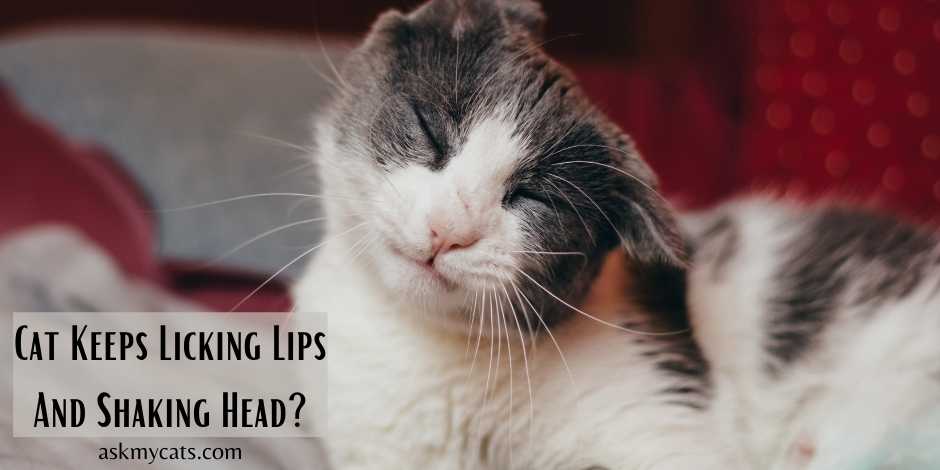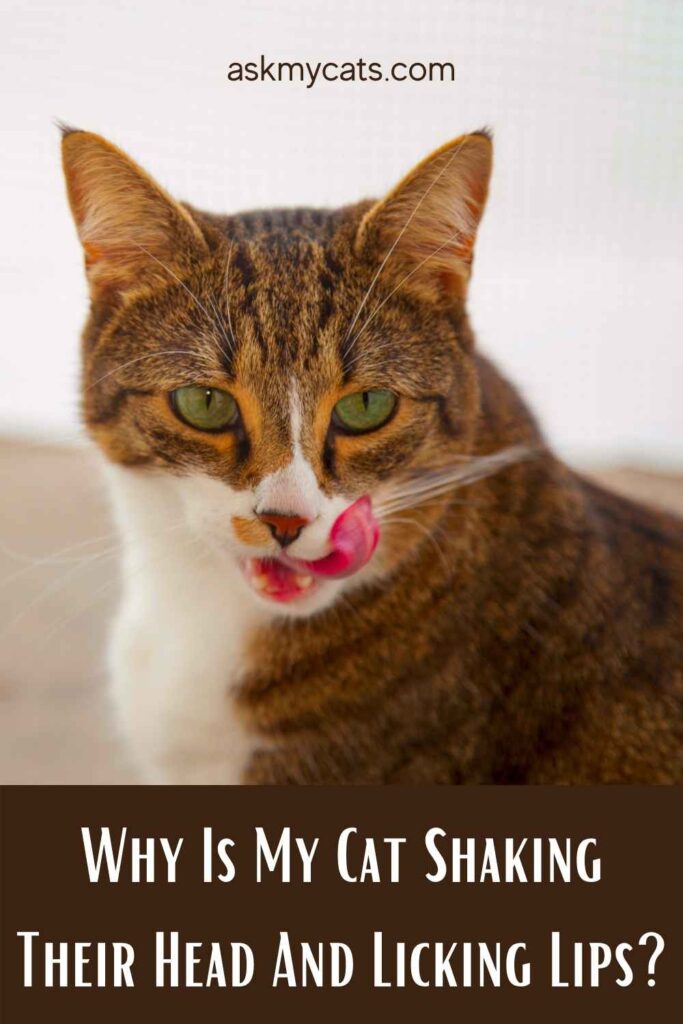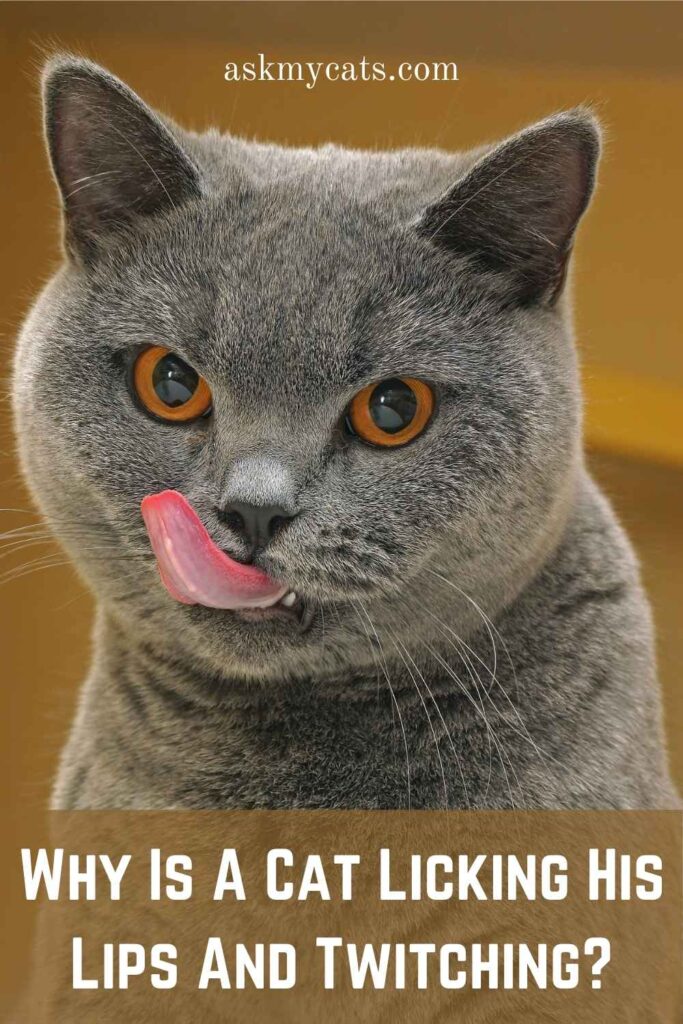Have you ever wondered why your cat would lick its lips? Pet owners may be concerned about “cat smacking lips,” particularly if it is a new activity or occurs in conjunction with other symptoms such as not feeding, vomiting, lethargy, fatigue, and/or diarrhoea.
Such cats are more “lickers” than those in general. Some cats lick their own lips, as well as the lips of the other cats in the house, the board, the counters, and other surfaces.
A cat who has started shaking his head while licking lips incessantly may be suffering from a medical problem that ranges from mild to severe which necessitates veterinary treatment.
If the problem is an underlying ear infection or a more serious illness, you’ll want to get to the bottom of it as soon as possible and contact your doctor so that care can continue and your cat can feel better.


Give Your Cat the Perfect Day
Get the Free Ebook!
Why Is My Cat Shaking Their Head And Licking Lips?
If your cat shakes his head accompanied by licking lips a lot, it’s a sign of a medical problem that may be exacerbated by a variety of disorders ranging from minor to major.
It’s important to get medical care for your cat’s head tremors, whether they’re caused by ear mites, an allergy, or a serious problem like bacterial peritonitis.

1. Ear Infections and Ear Mites
Cats, like dogs, can get ear infections. In fact, of all the possible causes of head shaking in cats, an ear infection is the most probable.
When you take your pet to the vet for head shaking, the vet can use an otoscope to imagine your cat’s ear canals.
This enables them to assess any possible canal infection as well as decide whether or not the tympanic membrane, also known as the ear drum, is intact.
Since certain ear drugs may be harmful to the inner ear, this phase is critical.
Your veterinarian will take measurements of your cat’s ear discharge after they have determined the condition of his or her ear drums.
They would then examine these swabs under a microscope.
Your veterinarian can detect two types of bacteria on the scope: cocci (circle-shaped) or rod-shaped bacteria, budding yeast, or ear mites.
Ear mites (Otodectes cynotis) are a type of ectoparasite that, while not universally found, are more common in cats than in dogs. They will cause severe scratching, which would almost certainly cause your cat to shake his head in relief.
Your doctor will decide what treatment to offer to cure the underlying infection or ear mite infestation based on what is observed under the microscope (and whether or not your cat’s ear drums are intact).
2. Allergies
Cats, like humans, can be allergic to a variety of items. Allergies in cats can be caused by touch, inhalation, food, or insects (particularly flea bites), and they typically manifest as excessive scratching around the head, body, and ears, as well as head shaking.
Your veterinarian can recommend anti-itch drugs, but he or she will also attempt to identify the allergen. Regardless of your cat’s risk for fleas, they will want to put him on a new monthly topical flea prevention.
To run a strict food experiment, they will choose to move your cat’s diet to a prescription, hydrolyzed food.
None but the recommended food will cross your cat’s lips for six to eight weeks during the food trials. Treats, people food, and flavoured vitamins all fall under this category.
Successfully completing a diet experiment will definitively diagnose whether or not your pet benefits from a food allergy whether you are able to continue with it and whether it is what the veterinarian recommends.
3. Polyps
Ear polyps, also known as feline inflammatory polyps, may occur in cats. These are benign growths that begin in the cat’s middle or outer ear mucous membranes.
Coughing, sneezing, head tilt, drooping eyelid, ear inflammation, or nasal discharge are all signs of an ear polyp, depending on where it is located. Surgical removal is the best way to successfully cure polyps.
4. Insect Bites
Cats, as natural predators, are vulnerable to insect bites, which usually affect the face and paws. Swelling, inflammation, scratching, hives, and head shaking are also possible symptoms of a localised bite response in certain cats.
If your veterinarian thinks your pet was bitten by a bug, antihistamines or steroids might be used to reduce inflammation.
In rare cases, the cat can have an anaphylactic response, which necessitates emergency health care.
5. Aural Hematoma
An aural (ear) hematoma, also known as ‘pillow ear,’ isn’t so much a cause of head shaking as it is something that can develop as a result of it.
The ear pinna (flap) contains a variety of tiny blood vessels, and if a cat (or dog) shakes their head hard enough for some cause, one or more of these blood vessels will burst. The pinna fills with blood and takes on a puffy, pillow-like look as this happens.
If your pet experiences an aural hematoma unexpectedly, your veterinarian will be able to negotiate medical choices with you and help you decide which is safest.
If your veterinarian believes your cat is a good candidate for it and the fluid isn’t causing too much pain, they can want to drain it.
Since there is now an empty room, the fluid is likely to re-accumulate; thus, your veterinarian can prescribe steroids to minimise inflammation, bandage the ear, or use cold laser treatment to try to avoid this.
If your vet chooses this treatment choice, your cat’s ear can crinkle when it heals. This is purely an aesthetic issue and will not affect your cat’s health. Furthermore, others may say that it adds character.
If your cat’s hematoma is more serious, your veterinarian can recommend surgery. If this is the case, the veterinarian will make an incision to remove the blood, and then suture the pinna together in a pattern that prevents it from filling up again until it has a chance to scar and heal.
If the vet opts for a cosmetic fix, crinkling of the ear is a less frequent care risk.
A cat’s head shaking can be caused by a variety of factors.
A real ear infection may not be the source of your cat’s head shaking, but even if it is, over-the-counter ear drops may not be appropriate with the form of infection your cat has and may cause adverse effects like deafness if the ear drum is weakened, so make an appointment with your usual doctor to have your cat’s head shaking evaluated.
Why Is A Cat Licking His Lips And Twitching?
Our cats interact with us in a variety of ways, which is why reading their body language is so critical. Their tails, ears, and eyes communicate with us, but their mouths do as well.
It’s easy to overlook something as simple as a cat licking his lips, so here’s why it’s important to be mindful of what’s actually going on when a cat licks his lips.
A cat licks his lips and twitches because Xerostomia is a condition in which a cat licks his lips. This is a disease that causes cats to lick their lips due to an excessively dry mouth.
If you’ve ever had your cat bite you, you’ll notice his sandpaper-like texture. On his lips, there are small backward-facing parts known as papillae.
These rugged bits serve as hooks for a variety of tasks, including brushing and pulling meat off bones.
These papillae, on the other hand, hold all that the cat gathers on his tongue, including mud, loose fur, and debris, which is eaten before ending up in hairballs in his stomach.
Meanwhile, if your cat has a foreign body in his mouth, such as a piece of thread, he would almost certainly be unable to chew it out and remove it.
Every now and then, the cat licks his tongue. There is no reason to be concerned about this situation. Cats’ natural practise of slamming their lips together after feeding is a natural way for them to groom themselves. They groom from their lips to the rest of their bodies with their tongue.
Since the hunter becomes the hunted, cats prefer to hide any evidence of blood or food in order to avoid more serious predators.

1. Ptyalism
If your cat smacks his lips constantly and shows no signs of stopping, he may be suffering from ptyalism. This occurs when his mouth produces too much saliva, resulting in other health issues.
In cats, ptyalism can cause nausea. Consider this source if your cat seems to be feeling nauseous.
Lip licking can become more common if cats are constantly vomiting and feeling nauseous.
Ptyalism may also manifest itself in cats refusing to eat or being unable to contain the amount of saliva in their mouth.
Ptyalism may develop as a result of kidney problems, in which the body develops too much saliva for the mouth to handle.
Keep a good watch on your pet and provide him with immediate proper treatment if any, as ptyalism does not go away with time. A trip to the veterinarian is the safest option.
If nothing suspicious is detected, the vet will determine his physical fitness and perform a thorough oral inspection of the cat’s teeth, as well as other medical tests. Your pet will be handled appropriately based on the circumstances.
Daily check-ups with your pet are strongly recommended in order to identify and remove any abnormalities as soon as possible. Vaccinate your cat against rabies and keep toxins such as household cleaning items out of his control.
2. Vomiting
Another factor that makes cats smash their lips can be vomiting. If a cat throws up, it is natural that it will lick its lips. As a result of its continued lip-licking, it has a high level of vomiting.
This may be the product of a disturbed stomach, which occurs after a cat eats something strange, such as stale food or a hairball.
Furthermore, vomiting can be accompanied by a lot of salivation and swallowing, making the cat sick. As a result, schedule a consultation with your veterinarian as soon as possible.
3. Lack Of Saliva
A lack of saliva, known as xerostomia, is likely to have the same problem as an unhealthy quantity of saliva. Cats’ mouths get gritty as a result of xerostomia, and they must lick their lips to compensate for the dryness.
If your cat is licking his lips excessively, xerostomia may be the cause. Some signs to look out for include poor breath, inflamed or contaminated oral tissues, and chewing and swallowing difficulties.
In this case, the solution is straightforward. Make sure your cat gets enough water every day. Pay particular attention to planning high-water-content meals by using specially formulated pet mouthwashes on a regular basis.
And if the signs haven’t gone away after this, you can take it to the vet for expert help. To relieve sore spots, the vet can recommend multiple doses of the oral solution.
4. Dental Problems
Dental complications are another explanation for a cat licking his lips. A fractured or abscessed tooth, as well as an object lodged in the mouth, may be a cause of discomfort for your pet.
You should provide your cat dental health treatment on a regular basis as a cat owner to diagnose and treat problems quickly.
5. Nausea
Along with drooling, retching, heavy breathing, coughing, and restlessness, licking lips may be a sign of cat nausea.
Treatment options depend on the source of your cat’s nausea and the veterinarian’s evaluation of his or her wellbeing. They both agree on one thing: the cat can remain hydrated while its food consumption is limited.
Since hairballs are the most common cause of sickness, it’s critical to brush the coat on a daily basis to eliminate loose hairs in addition to using unique therapies. As a result, during shaving, they do not touch the mouth.
Frequently Asked Questions
Can a cat that is shaking his head a lot and licking his lips be stressed?
It’s normally a symptom of dental or oral illness when cats lick their lips so often that their owners remember. Large concentrations of tartar can be unpleasant to chew, and eating tainted substance can make the cat sick.
Drooling and lip-smacking are two ways to convey nausea. Gingivitis, a type of gum disease, may flare up for a variety of causes, causing pain and discomfort.
Tooth root abscesses produce a foul odour in the mouth, and high-carbohydrate kibble food will dry out the mouth, causing tartar and calculus to build up.
Why a cat licks his lips and then swallows?
When cats chew their lips and then choke several times, it means they’re going to vomit or are about to vomit. To put it another way, there is nausea as well as abdominal movements.
It’s not a big deal if a cat throws up a furball. However, if the cat licks her lips constantly and vomits a substance, it may be due to a variety of medical issues. Older cats with renal problems frequently act this way because their kidneys haven’t been able to remove the contaminants that make them nauseous.
Final Words
Nausea, tooth pain, or ear pain can be shown by shaking the head and licking the lips. Try sending him a benadryl shot. You should administer benadryl to him.
Benadryl is given at a rate of 1 mg per pound of cat per 12 hours. So, a typical cat weighs about ten pounds. You should mix 1/2 of a 25 mg pill with some food and offer it to him.
Alternatively, you might give him 3 cc of the oil. Since cats dislike the taste of the liquid, it can cause him to drool.
To calm his stomach, you can even give him a human stomach acid reducer. Per 12 hours, take 1/4 of a 10 mg pepcid ac pill. You may have it in a dessert. You may also pulverise it, mix it with water, and administer it by syringe.
Giving the benadryl and pepcid ac together is good. You should keep an eye on him today as long as he is feeding and not in pain. If he doesn’t feel better by the next morning, he can visit a veterinarian.
If you have any questions in your mind which is left unanswered here, feel free to ask them in the comments section below!
